Organizational Culture and Performance
VerifiedAdded on 2020/05/28
|14
|3202
|260
AI Summary
This assignment delves into the crucial connection between organizational culture and firm performance. It examines various research studies that analyze how cultural factors influence innovation and overall organizational success. The provided literature discusses topics such as CEO leadership styles, the impact of activism on corporate responses to climate change, and the effectiveness of Total Quality Management (TQM) within different organizational cultures.
Contribute Materials
Your contribution can guide someone’s learning journey. Share your
documents today.
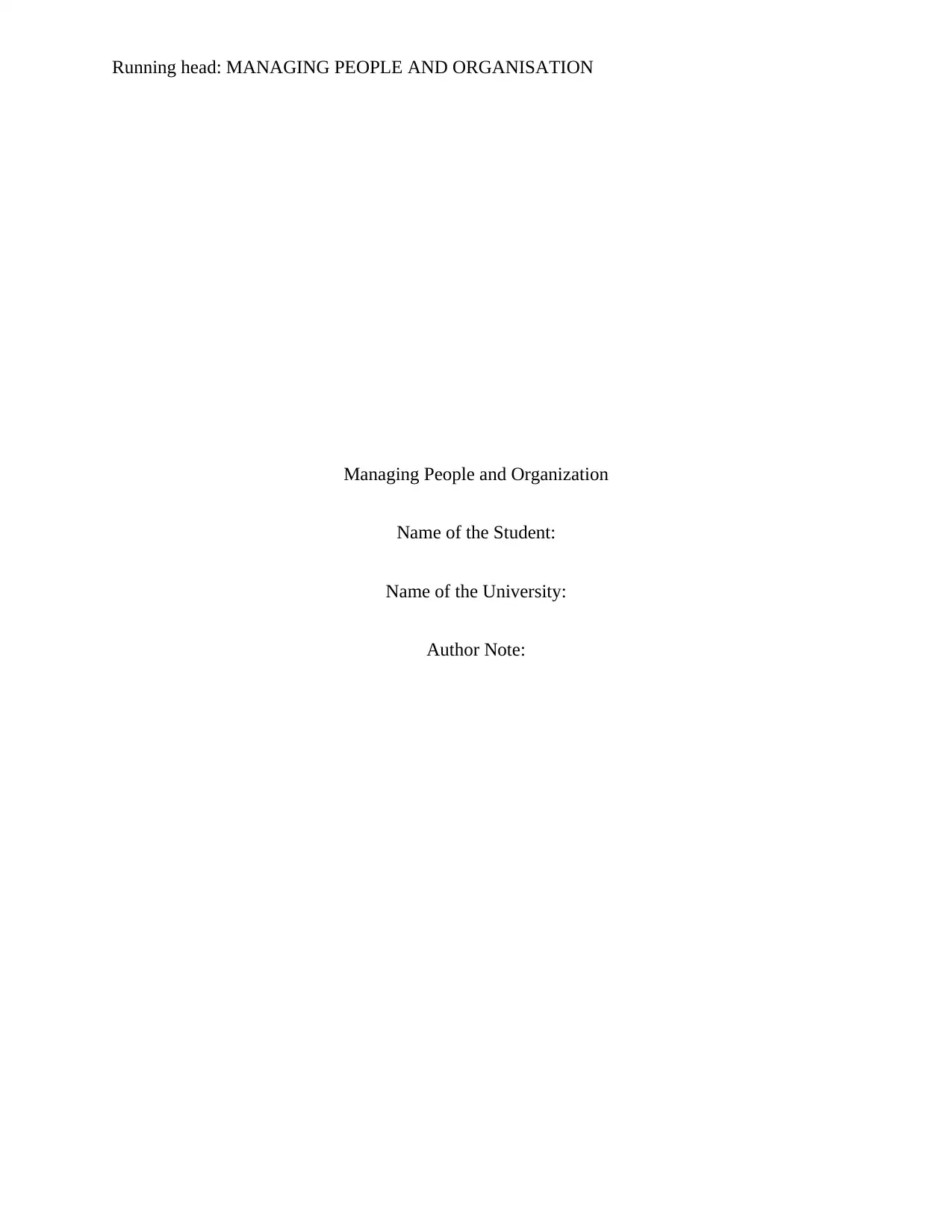
Running head: MANAGING PEOPLE AND ORGANISATION
Managing People and Organization
Name of the Student:
Name of the University:
Author Note:
Managing People and Organization
Name of the Student:
Name of the University:
Author Note:
Secure Best Marks with AI Grader
Need help grading? Try our AI Grader for instant feedback on your assignments.
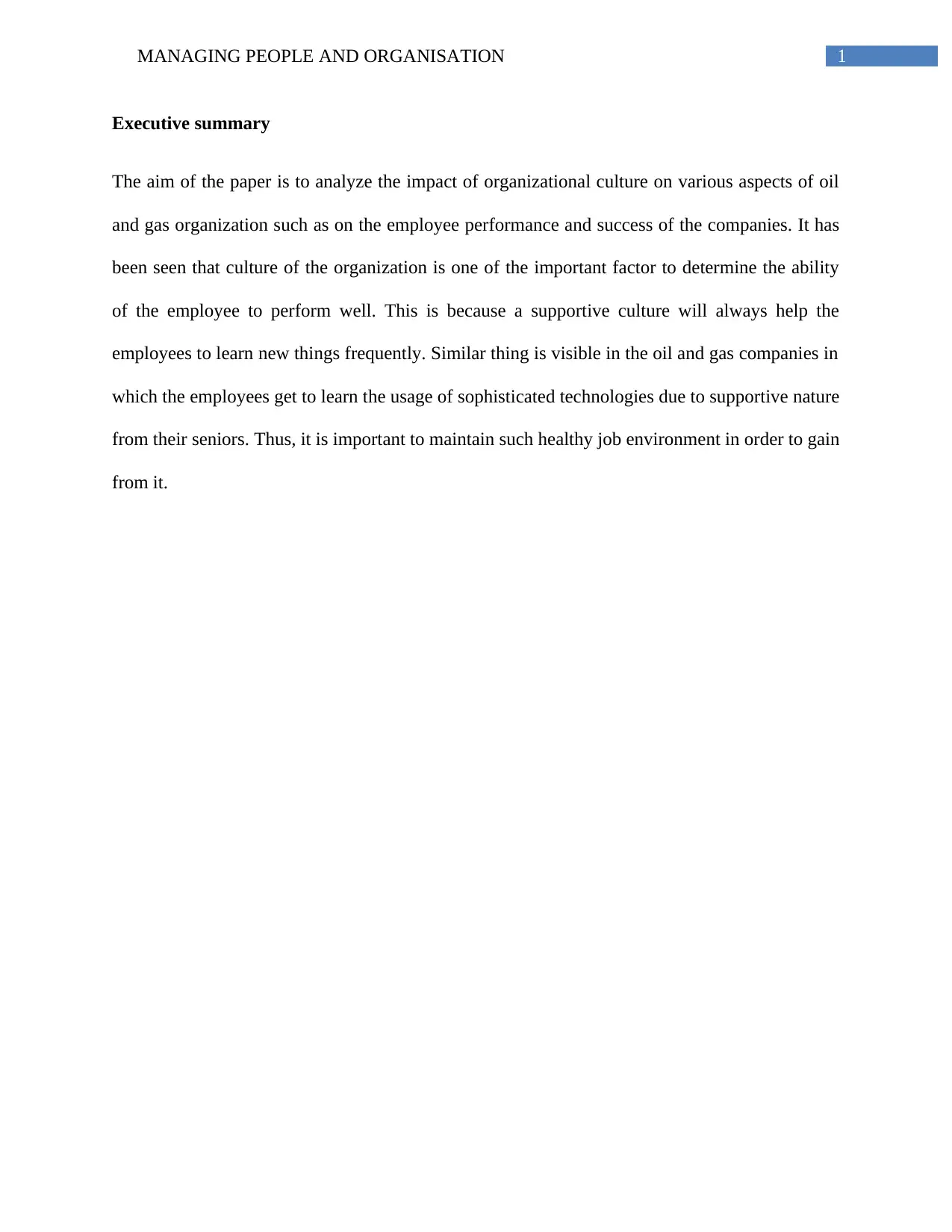
1MANAGING PEOPLE AND ORGANISATION
Executive summary
The aim of the paper is to analyze the impact of organizational culture on various aspects of oil
and gas organization such as on the employee performance and success of the companies. It has
been seen that culture of the organization is one of the important factor to determine the ability
of the employee to perform well. This is because a supportive culture will always help the
employees to learn new things frequently. Similar thing is visible in the oil and gas companies in
which the employees get to learn the usage of sophisticated technologies due to supportive nature
from their seniors. Thus, it is important to maintain such healthy job environment in order to gain
from it.
Executive summary
The aim of the paper is to analyze the impact of organizational culture on various aspects of oil
and gas organization such as on the employee performance and success of the companies. It has
been seen that culture of the organization is one of the important factor to determine the ability
of the employee to perform well. This is because a supportive culture will always help the
employees to learn new things frequently. Similar thing is visible in the oil and gas companies in
which the employees get to learn the usage of sophisticated technologies due to supportive nature
from their seniors. Thus, it is important to maintain such healthy job environment in order to gain
from it.
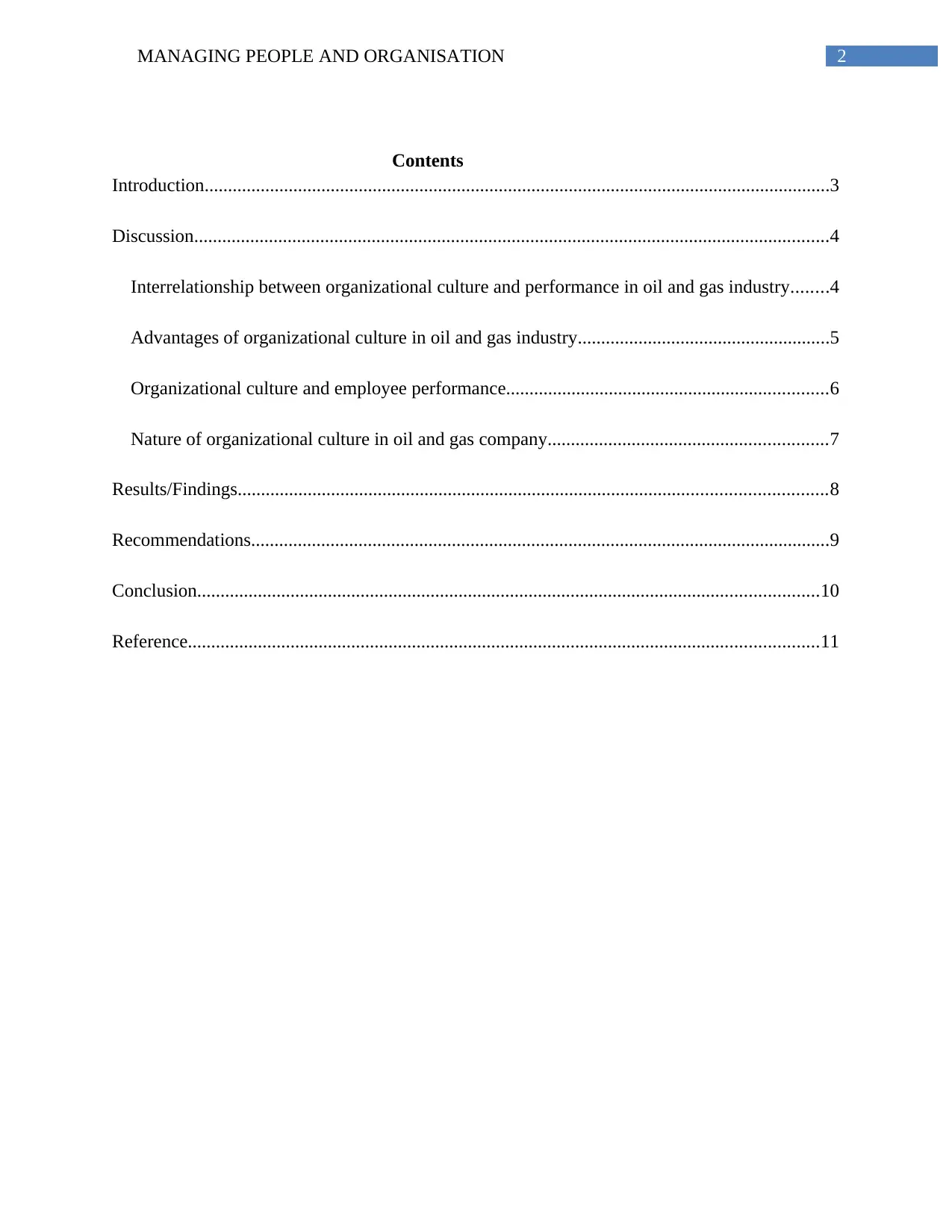
2MANAGING PEOPLE AND ORGANISATION
Contents
Introduction......................................................................................................................................3
Discussion........................................................................................................................................4
Interrelationship between organizational culture and performance in oil and gas industry........4
Advantages of organizational culture in oil and gas industry......................................................5
Organizational culture and employee performance.....................................................................6
Nature of organizational culture in oil and gas company............................................................7
Results/Findings..............................................................................................................................8
Recommendations............................................................................................................................9
Conclusion.....................................................................................................................................10
Reference.......................................................................................................................................11
Contents
Introduction......................................................................................................................................3
Discussion........................................................................................................................................4
Interrelationship between organizational culture and performance in oil and gas industry........4
Advantages of organizational culture in oil and gas industry......................................................5
Organizational culture and employee performance.....................................................................6
Nature of organizational culture in oil and gas company............................................................7
Results/Findings..............................................................................................................................8
Recommendations............................................................................................................................9
Conclusion.....................................................................................................................................10
Reference.......................................................................................................................................11
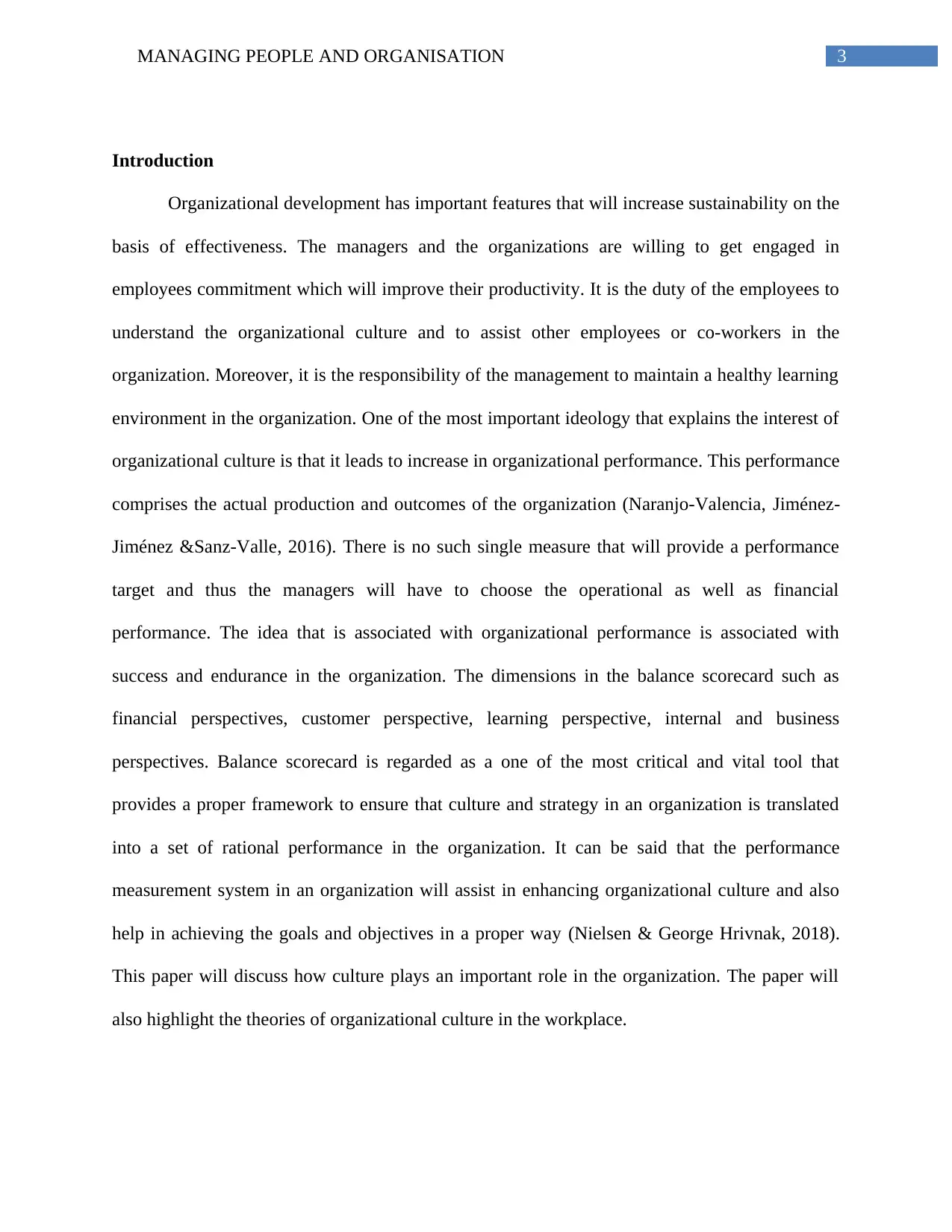
3MANAGING PEOPLE AND ORGANISATION
Introduction
Organizational development has important features that will increase sustainability on the
basis of effectiveness. The managers and the organizations are willing to get engaged in
employees commitment which will improve their productivity. It is the duty of the employees to
understand the organizational culture and to assist other employees or co-workers in the
organization. Moreover, it is the responsibility of the management to maintain a healthy learning
environment in the organization. One of the most important ideology that explains the interest of
organizational culture is that it leads to increase in organizational performance. This performance
comprises the actual production and outcomes of the organization (Naranjo-Valencia, Jiménez-
Jiménez &Sanz-Valle, 2016). There is no such single measure that will provide a performance
target and thus the managers will have to choose the operational as well as financial
performance. The idea that is associated with organizational performance is associated with
success and endurance in the organization. The dimensions in the balance scorecard such as
financial perspectives, customer perspective, learning perspective, internal and business
perspectives. Balance scorecard is regarded as a one of the most critical and vital tool that
provides a proper framework to ensure that culture and strategy in an organization is translated
into a set of rational performance in the organization. It can be said that the performance
measurement system in an organization will assist in enhancing organizational culture and also
help in achieving the goals and objectives in a proper way (Nielsen & George Hrivnak, 2018).
This paper will discuss how culture plays an important role in the organization. The paper will
also highlight the theories of organizational culture in the workplace.
Introduction
Organizational development has important features that will increase sustainability on the
basis of effectiveness. The managers and the organizations are willing to get engaged in
employees commitment which will improve their productivity. It is the duty of the employees to
understand the organizational culture and to assist other employees or co-workers in the
organization. Moreover, it is the responsibility of the management to maintain a healthy learning
environment in the organization. One of the most important ideology that explains the interest of
organizational culture is that it leads to increase in organizational performance. This performance
comprises the actual production and outcomes of the organization (Naranjo-Valencia, Jiménez-
Jiménez &Sanz-Valle, 2016). There is no such single measure that will provide a performance
target and thus the managers will have to choose the operational as well as financial
performance. The idea that is associated with organizational performance is associated with
success and endurance in the organization. The dimensions in the balance scorecard such as
financial perspectives, customer perspective, learning perspective, internal and business
perspectives. Balance scorecard is regarded as a one of the most critical and vital tool that
provides a proper framework to ensure that culture and strategy in an organization is translated
into a set of rational performance in the organization. It can be said that the performance
measurement system in an organization will assist in enhancing organizational culture and also
help in achieving the goals and objectives in a proper way (Nielsen & George Hrivnak, 2018).
This paper will discuss how culture plays an important role in the organization. The paper will
also highlight the theories of organizational culture in the workplace.
Secure Best Marks with AI Grader
Need help grading? Try our AI Grader for instant feedback on your assignments.
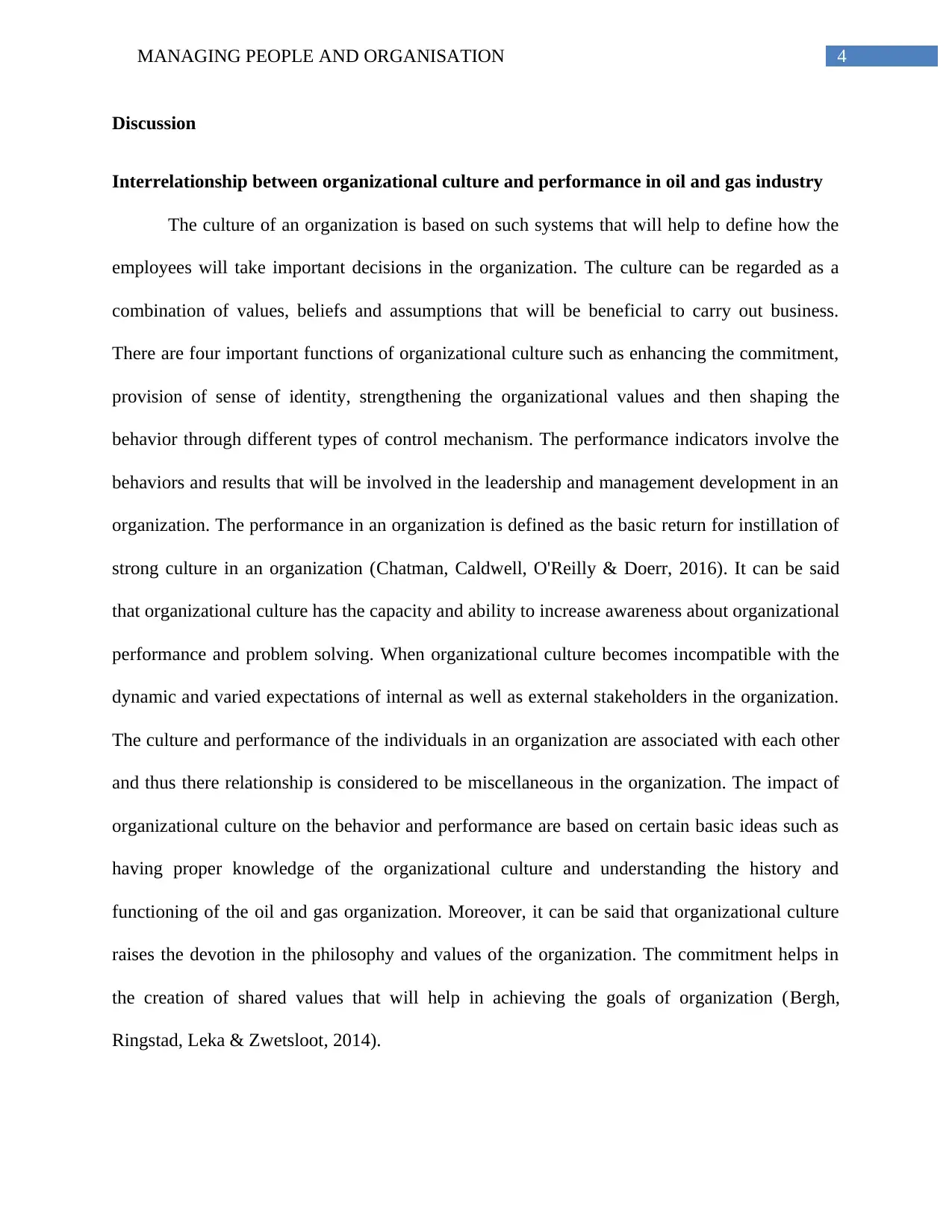
4MANAGING PEOPLE AND ORGANISATION
Discussion
Interrelationship between organizational culture and performance in oil and gas industry
The culture of an organization is based on such systems that will help to define how the
employees will take important decisions in the organization. The culture can be regarded as a
combination of values, beliefs and assumptions that will be beneficial to carry out business.
There are four important functions of organizational culture such as enhancing the commitment,
provision of sense of identity, strengthening the organizational values and then shaping the
behavior through different types of control mechanism. The performance indicators involve the
behaviors and results that will be involved in the leadership and management development in an
organization. The performance in an organization is defined as the basic return for instillation of
strong culture in an organization (Chatman, Caldwell, O'Reilly & Doerr, 2016). It can be said
that organizational culture has the capacity and ability to increase awareness about organizational
performance and problem solving. When organizational culture becomes incompatible with the
dynamic and varied expectations of internal as well as external stakeholders in the organization.
The culture and performance of the individuals in an organization are associated with each other
and thus there relationship is considered to be miscellaneous in the organization. The impact of
organizational culture on the behavior and performance are based on certain basic ideas such as
having proper knowledge of the organizational culture and understanding the history and
functioning of the oil and gas organization. Moreover, it can be said that organizational culture
raises the devotion in the philosophy and values of the organization. The commitment helps in
the creation of shared values that will help in achieving the goals of organization (Bergh,
Ringstad, Leka & Zwetsloot, 2014).
Discussion
Interrelationship between organizational culture and performance in oil and gas industry
The culture of an organization is based on such systems that will help to define how the
employees will take important decisions in the organization. The culture can be regarded as a
combination of values, beliefs and assumptions that will be beneficial to carry out business.
There are four important functions of organizational culture such as enhancing the commitment,
provision of sense of identity, strengthening the organizational values and then shaping the
behavior through different types of control mechanism. The performance indicators involve the
behaviors and results that will be involved in the leadership and management development in an
organization. The performance in an organization is defined as the basic return for instillation of
strong culture in an organization (Chatman, Caldwell, O'Reilly & Doerr, 2016). It can be said
that organizational culture has the capacity and ability to increase awareness about organizational
performance and problem solving. When organizational culture becomes incompatible with the
dynamic and varied expectations of internal as well as external stakeholders in the organization.
The culture and performance of the individuals in an organization are associated with each other
and thus there relationship is considered to be miscellaneous in the organization. The impact of
organizational culture on the behavior and performance are based on certain basic ideas such as
having proper knowledge of the organizational culture and understanding the history and
functioning of the oil and gas organization. Moreover, it can be said that organizational culture
raises the devotion in the philosophy and values of the organization. The commitment helps in
the creation of shared values that will help in achieving the goals of organization (Bergh,
Ringstad, Leka & Zwetsloot, 2014).
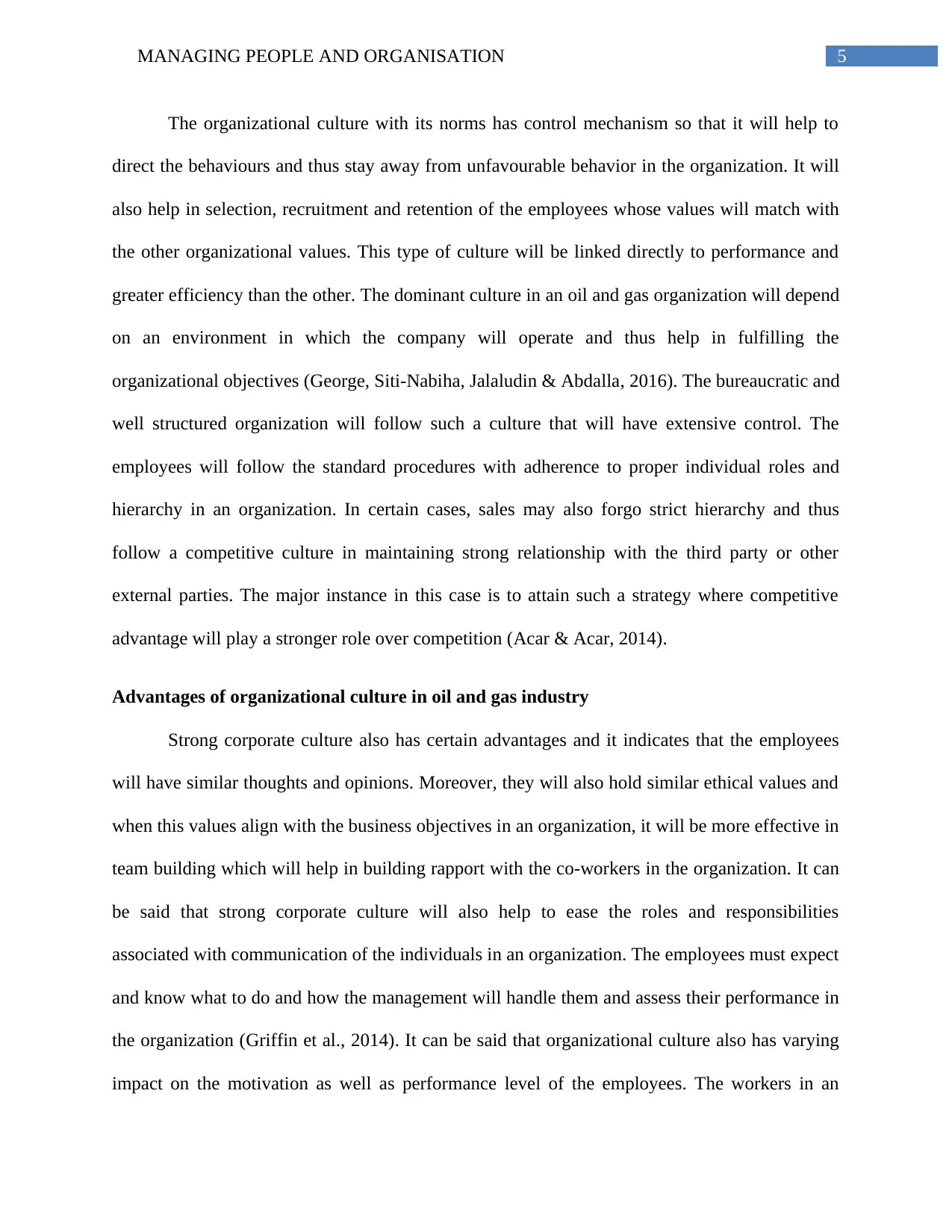
5MANAGING PEOPLE AND ORGANISATION
The organizational culture with its norms has control mechanism so that it will help to
direct the behaviours and thus stay away from unfavourable behavior in the organization. It will
also help in selection, recruitment and retention of the employees whose values will match with
the other organizational values. This type of culture will be linked directly to performance and
greater efficiency than the other. The dominant culture in an oil and gas organization will depend
on an environment in which the company will operate and thus help in fulfilling the
organizational objectives (George, Siti-Nabiha, Jalaludin & Abdalla, 2016). The bureaucratic and
well structured organization will follow such a culture that will have extensive control. The
employees will follow the standard procedures with adherence to proper individual roles and
hierarchy in an organization. In certain cases, sales may also forgo strict hierarchy and thus
follow a competitive culture in maintaining strong relationship with the third party or other
external parties. The major instance in this case is to attain such a strategy where competitive
advantage will play a stronger role over competition (Acar & Acar, 2014).
Advantages of organizational culture in oil and gas industry
Strong corporate culture also has certain advantages and it indicates that the employees
will have similar thoughts and opinions. Moreover, they will also hold similar ethical values and
when this values align with the business objectives in an organization, it will be more effective in
team building which will help in building rapport with the co-workers in the organization. It can
be said that strong corporate culture will also help to ease the roles and responsibilities
associated with communication of the individuals in an organization. The employees must expect
and know what to do and how the management will handle them and assess their performance in
the organization (Griffin et al., 2014). It can be said that organizational culture also has varying
impact on the motivation as well as performance level of the employees. The workers in an
The organizational culture with its norms has control mechanism so that it will help to
direct the behaviours and thus stay away from unfavourable behavior in the organization. It will
also help in selection, recruitment and retention of the employees whose values will match with
the other organizational values. This type of culture will be linked directly to performance and
greater efficiency than the other. The dominant culture in an oil and gas organization will depend
on an environment in which the company will operate and thus help in fulfilling the
organizational objectives (George, Siti-Nabiha, Jalaludin & Abdalla, 2016). The bureaucratic and
well structured organization will follow such a culture that will have extensive control. The
employees will follow the standard procedures with adherence to proper individual roles and
hierarchy in an organization. In certain cases, sales may also forgo strict hierarchy and thus
follow a competitive culture in maintaining strong relationship with the third party or other
external parties. The major instance in this case is to attain such a strategy where competitive
advantage will play a stronger role over competition (Acar & Acar, 2014).
Advantages of organizational culture in oil and gas industry
Strong corporate culture also has certain advantages and it indicates that the employees
will have similar thoughts and opinions. Moreover, they will also hold similar ethical values and
when this values align with the business objectives in an organization, it will be more effective in
team building which will help in building rapport with the co-workers in the organization. It can
be said that strong corporate culture will also help to ease the roles and responsibilities
associated with communication of the individuals in an organization. The employees must expect
and know what to do and how the management will handle them and assess their performance in
the organization (Griffin et al., 2014). It can be said that organizational culture also has varying
impact on the motivation as well as performance level of the employees. The workers in an
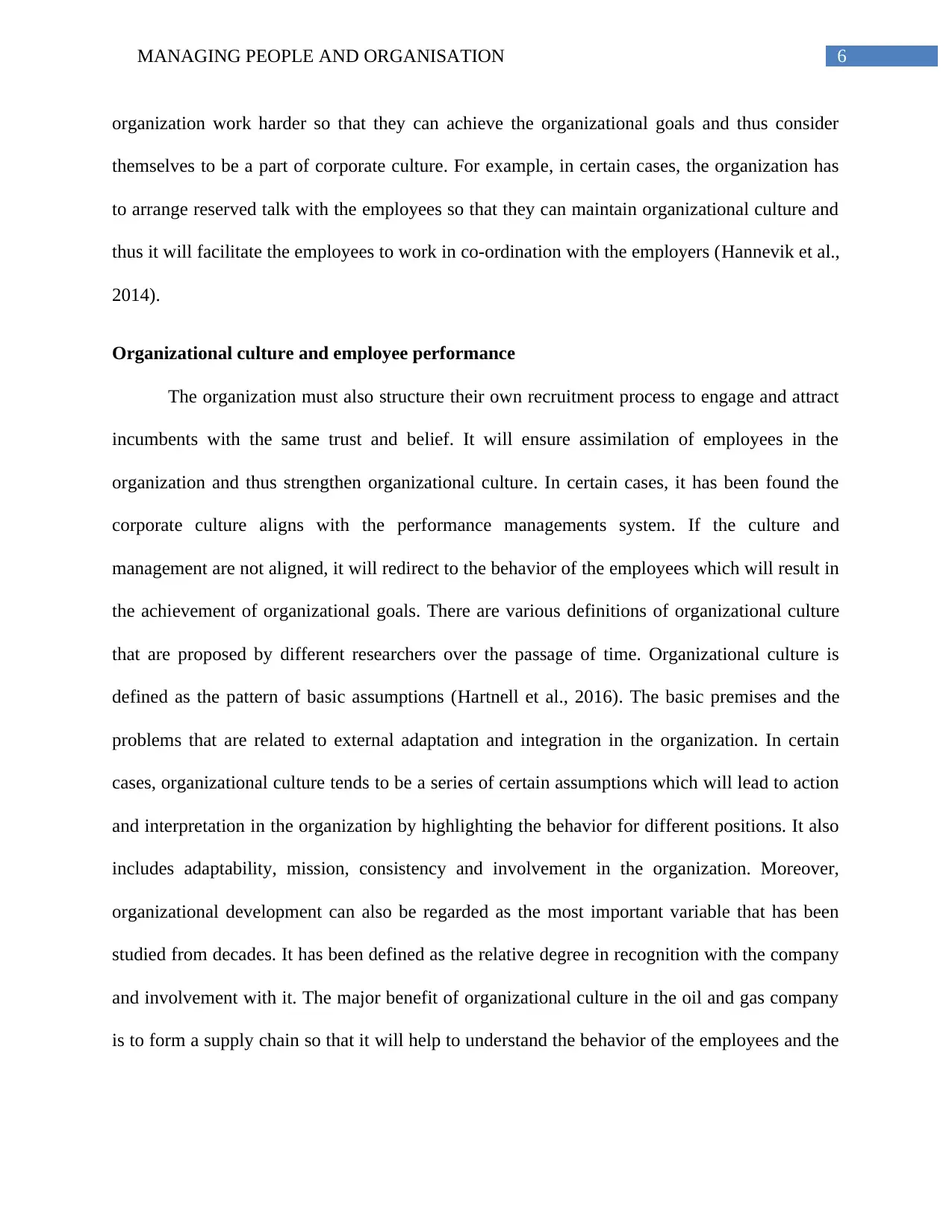
6MANAGING PEOPLE AND ORGANISATION
organization work harder so that they can achieve the organizational goals and thus consider
themselves to be a part of corporate culture. For example, in certain cases, the organization has
to arrange reserved talk with the employees so that they can maintain organizational culture and
thus it will facilitate the employees to work in co-ordination with the employers (Hannevik et al.,
2014).
Organizational culture and employee performance
The organization must also structure their own recruitment process to engage and attract
incumbents with the same trust and belief. It will ensure assimilation of employees in the
organization and thus strengthen organizational culture. In certain cases, it has been found the
corporate culture aligns with the performance managements system. If the culture and
management are not aligned, it will redirect to the behavior of the employees which will result in
the achievement of organizational goals. There are various definitions of organizational culture
that are proposed by different researchers over the passage of time. Organizational culture is
defined as the pattern of basic assumptions (Hartnell et al., 2016). The basic premises and the
problems that are related to external adaptation and integration in the organization. In certain
cases, organizational culture tends to be a series of certain assumptions which will lead to action
and interpretation in the organization by highlighting the behavior for different positions. It also
includes adaptability, mission, consistency and involvement in the organization. Moreover,
organizational development can also be regarded as the most important variable that has been
studied from decades. It has been defined as the relative degree in recognition with the company
and involvement with it. The major benefit of organizational culture in the oil and gas company
is to form a supply chain so that it will help to understand the behavior of the employees and the
organization work harder so that they can achieve the organizational goals and thus consider
themselves to be a part of corporate culture. For example, in certain cases, the organization has
to arrange reserved talk with the employees so that they can maintain organizational culture and
thus it will facilitate the employees to work in co-ordination with the employers (Hannevik et al.,
2014).
Organizational culture and employee performance
The organization must also structure their own recruitment process to engage and attract
incumbents with the same trust and belief. It will ensure assimilation of employees in the
organization and thus strengthen organizational culture. In certain cases, it has been found the
corporate culture aligns with the performance managements system. If the culture and
management are not aligned, it will redirect to the behavior of the employees which will result in
the achievement of organizational goals. There are various definitions of organizational culture
that are proposed by different researchers over the passage of time. Organizational culture is
defined as the pattern of basic assumptions (Hartnell et al., 2016). The basic premises and the
problems that are related to external adaptation and integration in the organization. In certain
cases, organizational culture tends to be a series of certain assumptions which will lead to action
and interpretation in the organization by highlighting the behavior for different positions. It also
includes adaptability, mission, consistency and involvement in the organization. Moreover,
organizational development can also be regarded as the most important variable that has been
studied from decades. It has been defined as the relative degree in recognition with the company
and involvement with it. The major benefit of organizational culture in the oil and gas company
is to form a supply chain so that it will help to understand the behavior of the employees and the
Paraphrase This Document
Need a fresh take? Get an instant paraphrase of this document with our AI Paraphraser
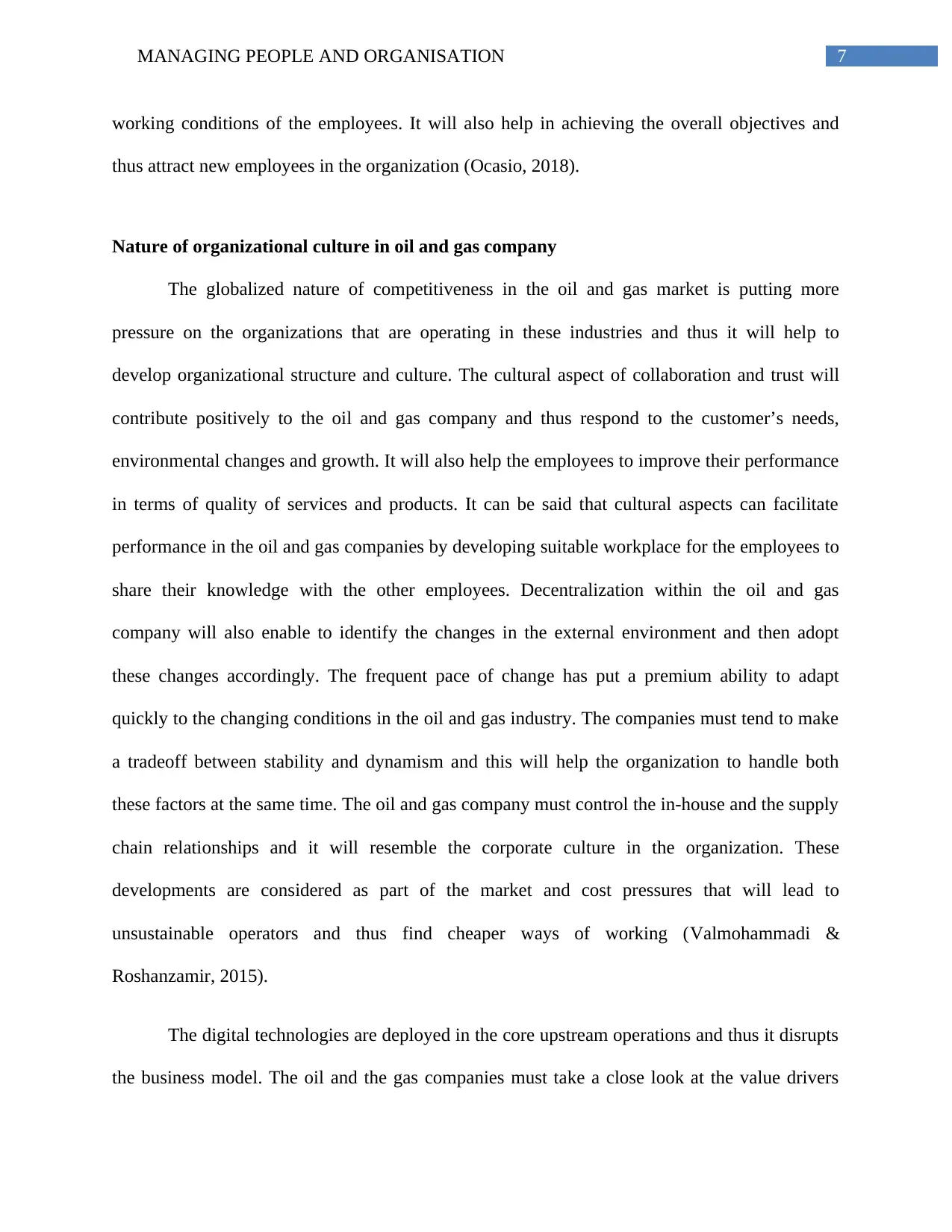
7MANAGING PEOPLE AND ORGANISATION
working conditions of the employees. It will also help in achieving the overall objectives and
thus attract new employees in the organization (Ocasio, 2018).
Nature of organizational culture in oil and gas company
The globalized nature of competitiveness in the oil and gas market is putting more
pressure on the organizations that are operating in these industries and thus it will help to
develop organizational structure and culture. The cultural aspect of collaboration and trust will
contribute positively to the oil and gas company and thus respond to the customer’s needs,
environmental changes and growth. It will also help the employees to improve their performance
in terms of quality of services and products. It can be said that cultural aspects can facilitate
performance in the oil and gas companies by developing suitable workplace for the employees to
share their knowledge with the other employees. Decentralization within the oil and gas
company will also enable to identify the changes in the external environment and then adopt
these changes accordingly. The frequent pace of change has put a premium ability to adapt
quickly to the changing conditions in the oil and gas industry. The companies must tend to make
a tradeoff between stability and dynamism and this will help the organization to handle both
these factors at the same time. The oil and gas company must control the in-house and the supply
chain relationships and it will resemble the corporate culture in the organization. These
developments are considered as part of the market and cost pressures that will lead to
unsustainable operators and thus find cheaper ways of working (Valmohammadi &
Roshanzamir, 2015).
The digital technologies are deployed in the core upstream operations and thus it disrupts
the business model. The oil and the gas companies must take a close look at the value drivers
working conditions of the employees. It will also help in achieving the overall objectives and
thus attract new employees in the organization (Ocasio, 2018).
Nature of organizational culture in oil and gas company
The globalized nature of competitiveness in the oil and gas market is putting more
pressure on the organizations that are operating in these industries and thus it will help to
develop organizational structure and culture. The cultural aspect of collaboration and trust will
contribute positively to the oil and gas company and thus respond to the customer’s needs,
environmental changes and growth. It will also help the employees to improve their performance
in terms of quality of services and products. It can be said that cultural aspects can facilitate
performance in the oil and gas companies by developing suitable workplace for the employees to
share their knowledge with the other employees. Decentralization within the oil and gas
company will also enable to identify the changes in the external environment and then adopt
these changes accordingly. The frequent pace of change has put a premium ability to adapt
quickly to the changing conditions in the oil and gas industry. The companies must tend to make
a tradeoff between stability and dynamism and this will help the organization to handle both
these factors at the same time. The oil and gas company must control the in-house and the supply
chain relationships and it will resemble the corporate culture in the organization. These
developments are considered as part of the market and cost pressures that will lead to
unsustainable operators and thus find cheaper ways of working (Valmohammadi &
Roshanzamir, 2015).
The digital technologies are deployed in the core upstream operations and thus it disrupts
the business model. The oil and the gas companies must take a close look at the value drivers
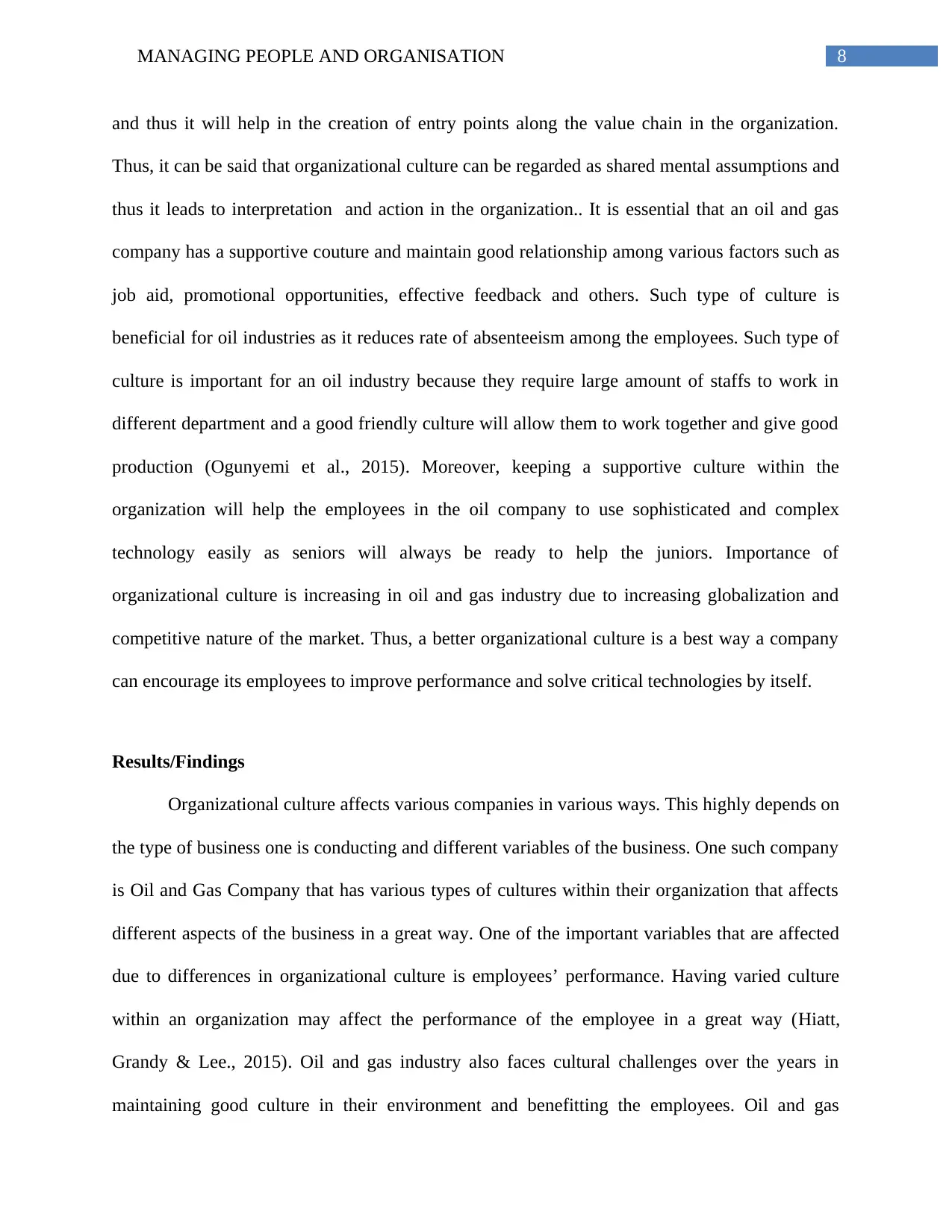
8MANAGING PEOPLE AND ORGANISATION
and thus it will help in the creation of entry points along the value chain in the organization.
Thus, it can be said that organizational culture can be regarded as shared mental assumptions and
thus it leads to interpretation and action in the organization.. It is essential that an oil and gas
company has a supportive couture and maintain good relationship among various factors such as
job aid, promotional opportunities, effective feedback and others. Such type of culture is
beneficial for oil industries as it reduces rate of absenteeism among the employees. Such type of
culture is important for an oil industry because they require large amount of staffs to work in
different department and a good friendly culture will allow them to work together and give good
production (Ogunyemi et al., 2015). Moreover, keeping a supportive culture within the
organization will help the employees in the oil company to use sophisticated and complex
technology easily as seniors will always be ready to help the juniors. Importance of
organizational culture is increasing in oil and gas industry due to increasing globalization and
competitive nature of the market. Thus, a better organizational culture is a best way a company
can encourage its employees to improve performance and solve critical technologies by itself.
Results/Findings
Organizational culture affects various companies in various ways. This highly depends on
the type of business one is conducting and different variables of the business. One such company
is Oil and Gas Company that has various types of cultures within their organization that affects
different aspects of the business in a great way. One of the important variables that are affected
due to differences in organizational culture is employees’ performance. Having varied culture
within an organization may affect the performance of the employee in a great way (Hiatt,
Grandy & Lee., 2015). Oil and gas industry also faces cultural challenges over the years in
maintaining good culture in their environment and benefitting the employees. Oil and gas
and thus it will help in the creation of entry points along the value chain in the organization.
Thus, it can be said that organizational culture can be regarded as shared mental assumptions and
thus it leads to interpretation and action in the organization.. It is essential that an oil and gas
company has a supportive couture and maintain good relationship among various factors such as
job aid, promotional opportunities, effective feedback and others. Such type of culture is
beneficial for oil industries as it reduces rate of absenteeism among the employees. Such type of
culture is important for an oil industry because they require large amount of staffs to work in
different department and a good friendly culture will allow them to work together and give good
production (Ogunyemi et al., 2015). Moreover, keeping a supportive culture within the
organization will help the employees in the oil company to use sophisticated and complex
technology easily as seniors will always be ready to help the juniors. Importance of
organizational culture is increasing in oil and gas industry due to increasing globalization and
competitive nature of the market. Thus, a better organizational culture is a best way a company
can encourage its employees to improve performance and solve critical technologies by itself.
Results/Findings
Organizational culture affects various companies in various ways. This highly depends on
the type of business one is conducting and different variables of the business. One such company
is Oil and Gas Company that has various types of cultures within their organization that affects
different aspects of the business in a great way. One of the important variables that are affected
due to differences in organizational culture is employees’ performance. Having varied culture
within an organization may affect the performance of the employee in a great way (Hiatt,
Grandy & Lee., 2015). Oil and gas industry also faces cultural challenges over the years in
maintaining good culture in their environment and benefitting the employees. Oil and gas
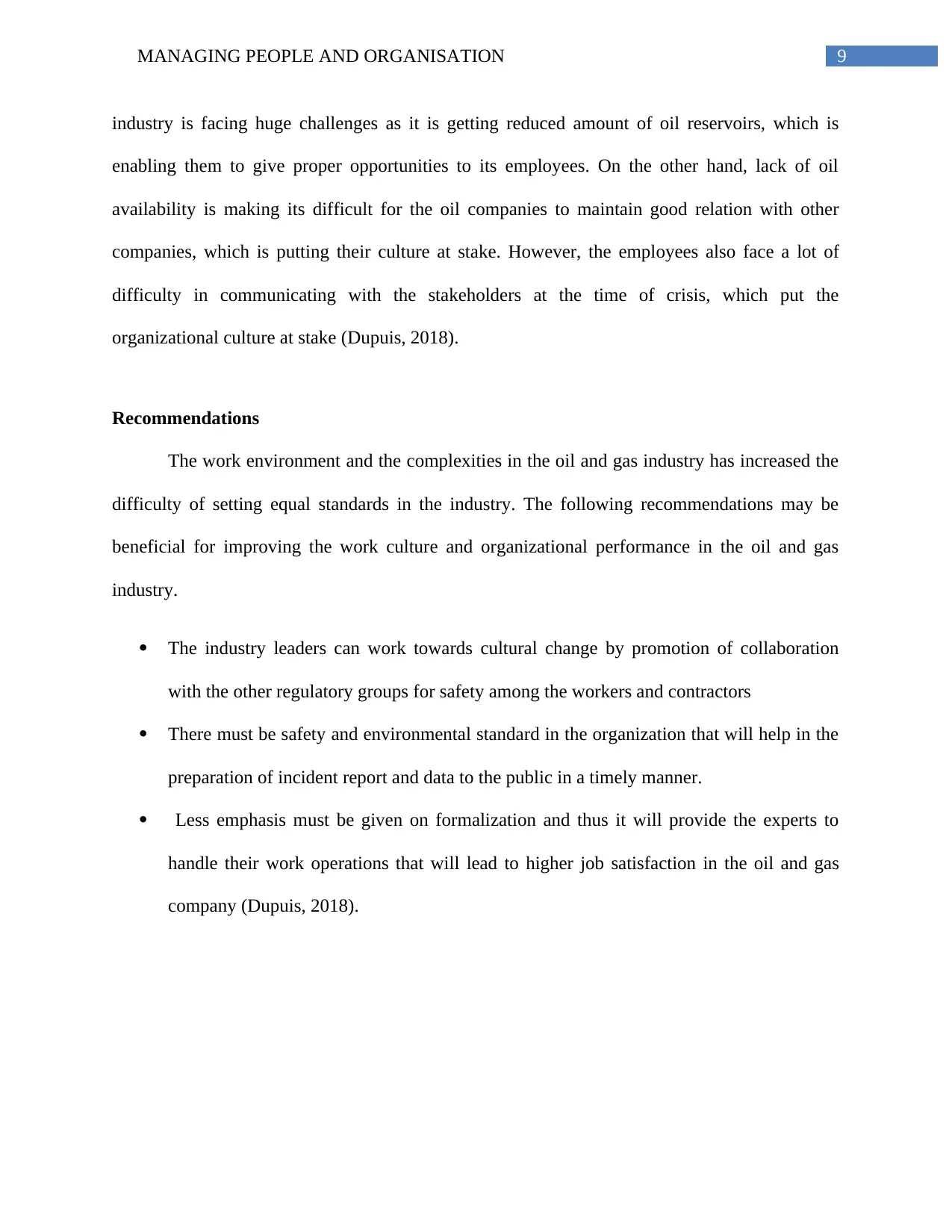
9MANAGING PEOPLE AND ORGANISATION
industry is facing huge challenges as it is getting reduced amount of oil reservoirs, which is
enabling them to give proper opportunities to its employees. On the other hand, lack of oil
availability is making its difficult for the oil companies to maintain good relation with other
companies, which is putting their culture at stake. However, the employees also face a lot of
difficulty in communicating with the stakeholders at the time of crisis, which put the
organizational culture at stake (Dupuis, 2018).
Recommendations
The work environment and the complexities in the oil and gas industry has increased the
difficulty of setting equal standards in the industry. The following recommendations may be
beneficial for improving the work culture and organizational performance in the oil and gas
industry.
The industry leaders can work towards cultural change by promotion of collaboration
with the other regulatory groups for safety among the workers and contractors
There must be safety and environmental standard in the organization that will help in the
preparation of incident report and data to the public in a timely manner.
Less emphasis must be given on formalization and thus it will provide the experts to
handle their work operations that will lead to higher job satisfaction in the oil and gas
company (Dupuis, 2018).
industry is facing huge challenges as it is getting reduced amount of oil reservoirs, which is
enabling them to give proper opportunities to its employees. On the other hand, lack of oil
availability is making its difficult for the oil companies to maintain good relation with other
companies, which is putting their culture at stake. However, the employees also face a lot of
difficulty in communicating with the stakeholders at the time of crisis, which put the
organizational culture at stake (Dupuis, 2018).
Recommendations
The work environment and the complexities in the oil and gas industry has increased the
difficulty of setting equal standards in the industry. The following recommendations may be
beneficial for improving the work culture and organizational performance in the oil and gas
industry.
The industry leaders can work towards cultural change by promotion of collaboration
with the other regulatory groups for safety among the workers and contractors
There must be safety and environmental standard in the organization that will help in the
preparation of incident report and data to the public in a timely manner.
Less emphasis must be given on formalization and thus it will provide the experts to
handle their work operations that will lead to higher job satisfaction in the oil and gas
company (Dupuis, 2018).
Secure Best Marks with AI Grader
Need help grading? Try our AI Grader for instant feedback on your assignments.
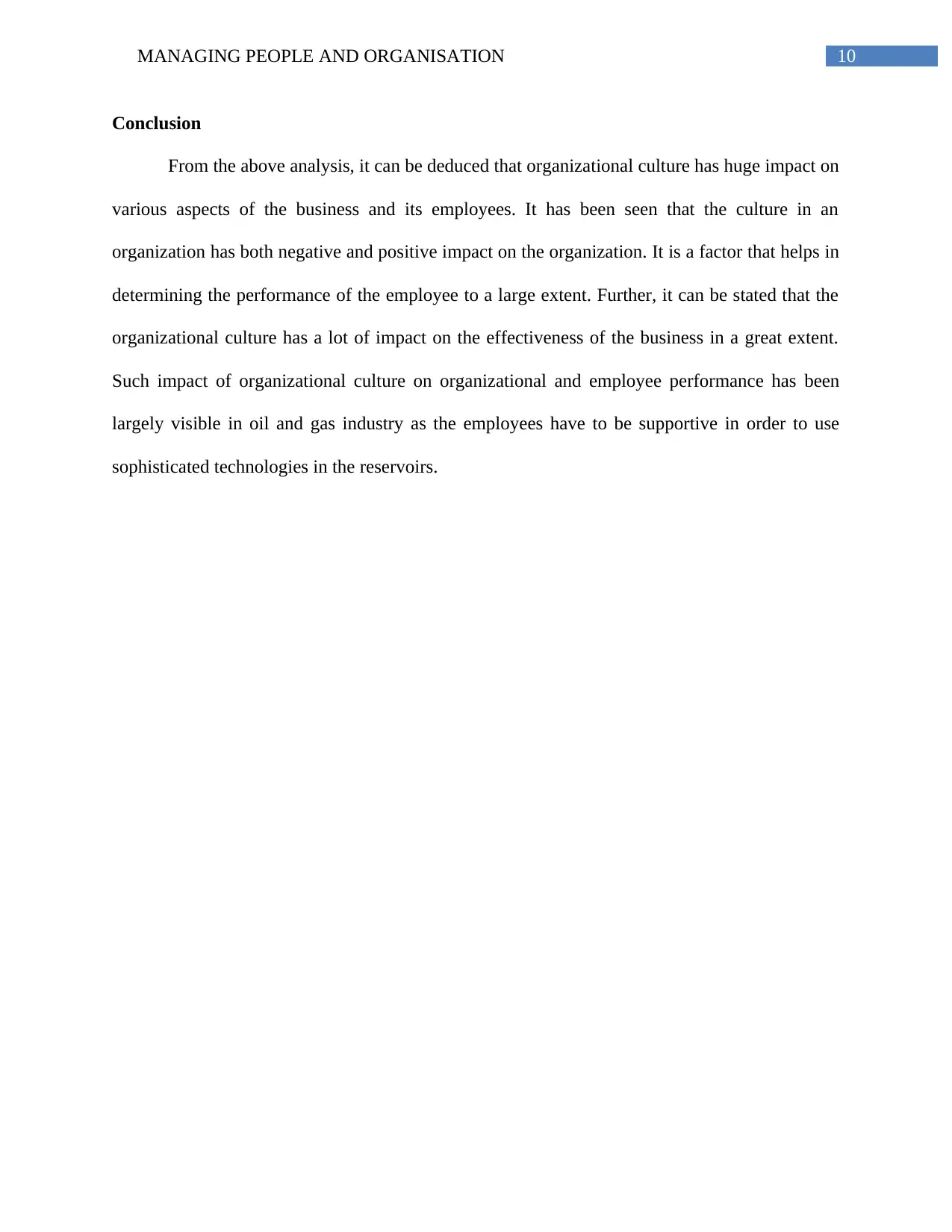
10MANAGING PEOPLE AND ORGANISATION
Conclusion
From the above analysis, it can be deduced that organizational culture has huge impact on
various aspects of the business and its employees. It has been seen that the culture in an
organization has both negative and positive impact on the organization. It is a factor that helps in
determining the performance of the employee to a large extent. Further, it can be stated that the
organizational culture has a lot of impact on the effectiveness of the business in a great extent.
Such impact of organizational culture on organizational and employee performance has been
largely visible in oil and gas industry as the employees have to be supportive in order to use
sophisticated technologies in the reservoirs.
Conclusion
From the above analysis, it can be deduced that organizational culture has huge impact on
various aspects of the business and its employees. It has been seen that the culture in an
organization has both negative and positive impact on the organization. It is a factor that helps in
determining the performance of the employee to a large extent. Further, it can be stated that the
organizational culture has a lot of impact on the effectiveness of the business in a great extent.
Such impact of organizational culture on organizational and employee performance has been
largely visible in oil and gas industry as the employees have to be supportive in order to use
sophisticated technologies in the reservoirs.
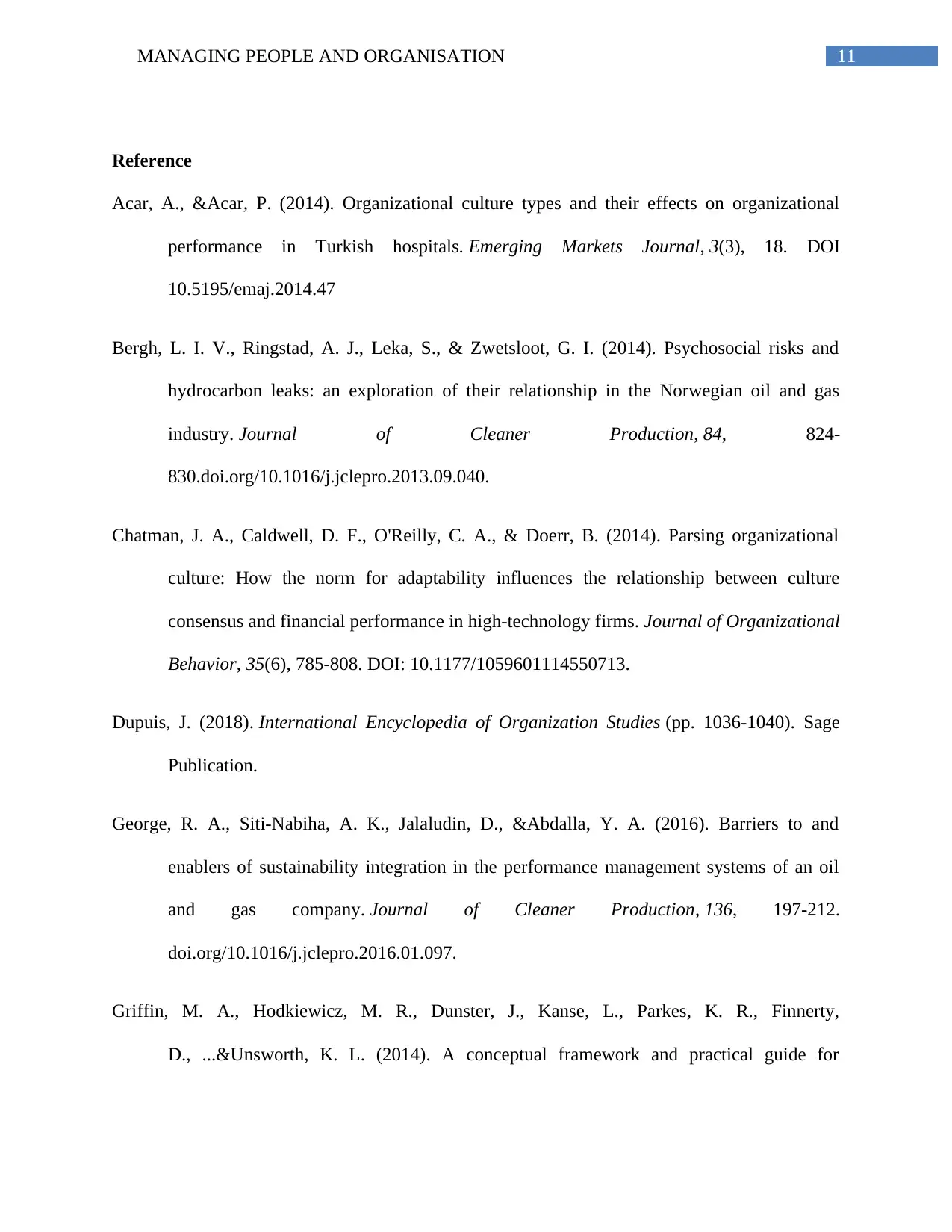
11MANAGING PEOPLE AND ORGANISATION
Reference
Acar, A., &Acar, P. (2014). Organizational culture types and their effects on organizational
performance in Turkish hospitals. Emerging Markets Journal, 3(3), 18. DOI
10.5195/emaj.2014.47
Bergh, L. I. V., Ringstad, A. J., Leka, S., & Zwetsloot, G. I. (2014). Psychosocial risks and
hydrocarbon leaks: an exploration of their relationship in the Norwegian oil and gas
industry. Journal of Cleaner Production, 84, 824-
830.doi.org/10.1016/j.jclepro.2013.09.040.
Chatman, J. A., Caldwell, D. F., O'Reilly, C. A., & Doerr, B. (2014). Parsing organizational
culture: How the norm for adaptability influences the relationship between culture
consensus and financial performance in high‐technology firms. Journal of Organizational
Behavior, 35(6), 785-808. DOI: 10.1177/1059601114550713.
Dupuis, J. (2018). International Encyclopedia of Organization Studies (pp. 1036-1040). Sage
Publication.
George, R. A., Siti-Nabiha, A. K., Jalaludin, D., &Abdalla, Y. A. (2016). Barriers to and
enablers of sustainability integration in the performance management systems of an oil
and gas company. Journal of Cleaner Production, 136, 197-212.
doi.org/10.1016/j.jclepro.2016.01.097.
Griffin, M. A., Hodkiewicz, M. R., Dunster, J., Kanse, L., Parkes, K. R., Finnerty,
D., ...&Unsworth, K. L. (2014). A conceptual framework and practical guide for
Reference
Acar, A., &Acar, P. (2014). Organizational culture types and their effects on organizational
performance in Turkish hospitals. Emerging Markets Journal, 3(3), 18. DOI
10.5195/emaj.2014.47
Bergh, L. I. V., Ringstad, A. J., Leka, S., & Zwetsloot, G. I. (2014). Psychosocial risks and
hydrocarbon leaks: an exploration of their relationship in the Norwegian oil and gas
industry. Journal of Cleaner Production, 84, 824-
830.doi.org/10.1016/j.jclepro.2013.09.040.
Chatman, J. A., Caldwell, D. F., O'Reilly, C. A., & Doerr, B. (2014). Parsing organizational
culture: How the norm for adaptability influences the relationship between culture
consensus and financial performance in high‐technology firms. Journal of Organizational
Behavior, 35(6), 785-808. DOI: 10.1177/1059601114550713.
Dupuis, J. (2018). International Encyclopedia of Organization Studies (pp. 1036-1040). Sage
Publication.
George, R. A., Siti-Nabiha, A. K., Jalaludin, D., &Abdalla, Y. A. (2016). Barriers to and
enablers of sustainability integration in the performance management systems of an oil
and gas company. Journal of Cleaner Production, 136, 197-212.
doi.org/10.1016/j.jclepro.2016.01.097.
Griffin, M. A., Hodkiewicz, M. R., Dunster, J., Kanse, L., Parkes, K. R., Finnerty,
D., ...&Unsworth, K. L. (2014). A conceptual framework and practical guide for
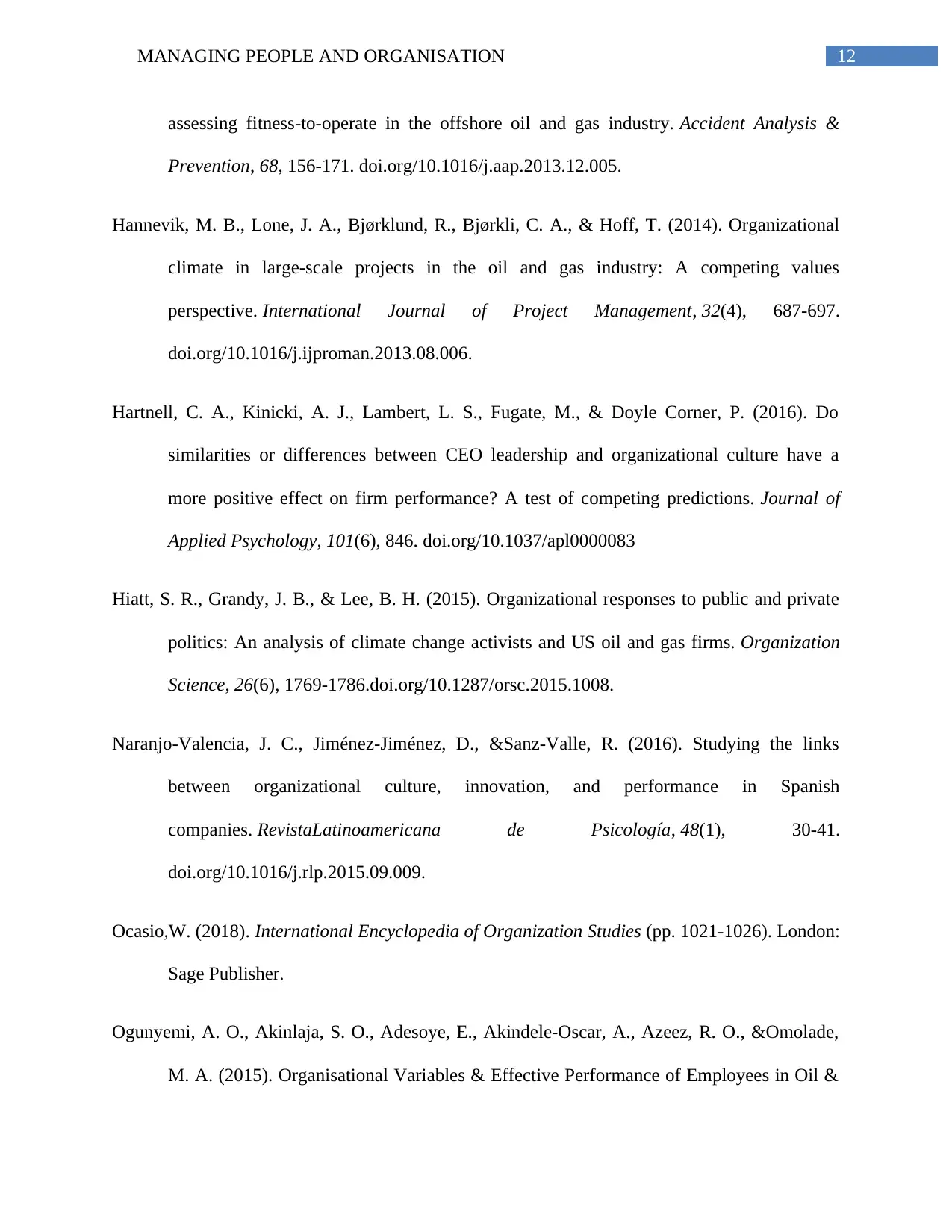
12MANAGING PEOPLE AND ORGANISATION
assessing fitness-to-operate in the offshore oil and gas industry. Accident Analysis &
Prevention, 68, 156-171. doi.org/10.1016/j.aap.2013.12.005.
Hannevik, M. B., Lone, J. A., Bjørklund, R., Bjørkli, C. A., & Hoff, T. (2014). Organizational
climate in large-scale projects in the oil and gas industry: A competing values
perspective. International Journal of Project Management, 32(4), 687-697.
doi.org/10.1016/j.ijproman.2013.08.006.
Hartnell, C. A., Kinicki, A. J., Lambert, L. S., Fugate, M., & Doyle Corner, P. (2016). Do
similarities or differences between CEO leadership and organizational culture have a
more positive effect on firm performance? A test of competing predictions. Journal of
Applied Psychology, 101(6), 846. doi.org/10.1037/apl0000083
Hiatt, S. R., Grandy, J. B., & Lee, B. H. (2015). Organizational responses to public and private
politics: An analysis of climate change activists and US oil and gas firms. Organization
Science, 26(6), 1769-1786.doi.org/10.1287/orsc.2015.1008.
Naranjo-Valencia, J. C., Jiménez-Jiménez, D., &Sanz-Valle, R. (2016). Studying the links
between organizational culture, innovation, and performance in Spanish
companies. RevistaLatinoamericana de Psicología, 48(1), 30-41.
doi.org/10.1016/j.rlp.2015.09.009.
Ocasio,W. (2018). International Encyclopedia of Organization Studies (pp. 1021-1026). London:
Sage Publisher.
Ogunyemi, A. O., Akinlaja, S. O., Adesoye, E., Akindele-Oscar, A., Azeez, R. O., &Omolade,
M. A. (2015). Organisational Variables & Effective Performance of Employees in Oil &
assessing fitness-to-operate in the offshore oil and gas industry. Accident Analysis &
Prevention, 68, 156-171. doi.org/10.1016/j.aap.2013.12.005.
Hannevik, M. B., Lone, J. A., Bjørklund, R., Bjørkli, C. A., & Hoff, T. (2014). Organizational
climate in large-scale projects in the oil and gas industry: A competing values
perspective. International Journal of Project Management, 32(4), 687-697.
doi.org/10.1016/j.ijproman.2013.08.006.
Hartnell, C. A., Kinicki, A. J., Lambert, L. S., Fugate, M., & Doyle Corner, P. (2016). Do
similarities or differences between CEO leadership and organizational culture have a
more positive effect on firm performance? A test of competing predictions. Journal of
Applied Psychology, 101(6), 846. doi.org/10.1037/apl0000083
Hiatt, S. R., Grandy, J. B., & Lee, B. H. (2015). Organizational responses to public and private
politics: An analysis of climate change activists and US oil and gas firms. Organization
Science, 26(6), 1769-1786.doi.org/10.1287/orsc.2015.1008.
Naranjo-Valencia, J. C., Jiménez-Jiménez, D., &Sanz-Valle, R. (2016). Studying the links
between organizational culture, innovation, and performance in Spanish
companies. RevistaLatinoamericana de Psicología, 48(1), 30-41.
doi.org/10.1016/j.rlp.2015.09.009.
Ocasio,W. (2018). International Encyclopedia of Organization Studies (pp. 1021-1026). London:
Sage Publisher.
Ogunyemi, A. O., Akinlaja, S. O., Adesoye, E., Akindele-Oscar, A., Azeez, R. O., &Omolade,
M. A. (2015). Organisational Variables & Effective Performance of Employees in Oil &
Paraphrase This Document
Need a fresh take? Get an instant paraphrase of this document with our AI Paraphraser
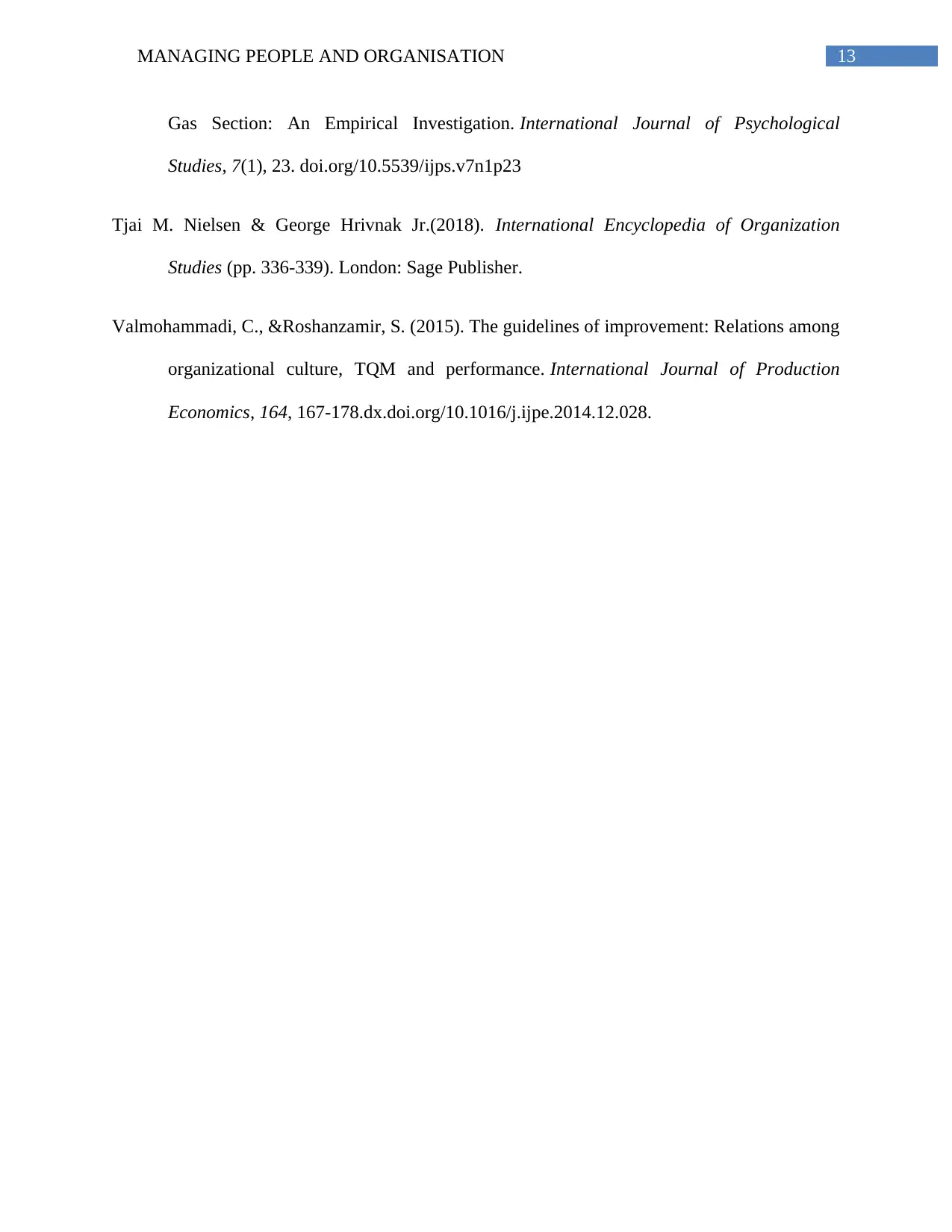
13MANAGING PEOPLE AND ORGANISATION
Gas Section: An Empirical Investigation. International Journal of Psychological
Studies, 7(1), 23. doi.org/10.5539/ijps.v7n1p23
Tjai M. Nielsen & George Hrivnak Jr.(2018). International Encyclopedia of Organization
Studies (pp. 336-339). London: Sage Publisher.
Valmohammadi, C., &Roshanzamir, S. (2015). The guidelines of improvement: Relations among
organizational culture, TQM and performance. International Journal of Production
Economics, 164, 167-178.dx.doi.org/10.1016/j.ijpe.2014.12.028.
Gas Section: An Empirical Investigation. International Journal of Psychological
Studies, 7(1), 23. doi.org/10.5539/ijps.v7n1p23
Tjai M. Nielsen & George Hrivnak Jr.(2018). International Encyclopedia of Organization
Studies (pp. 336-339). London: Sage Publisher.
Valmohammadi, C., &Roshanzamir, S. (2015). The guidelines of improvement: Relations among
organizational culture, TQM and performance. International Journal of Production
Economics, 164, 167-178.dx.doi.org/10.1016/j.ijpe.2014.12.028.
1 out of 14
Related Documents
Your All-in-One AI-Powered Toolkit for Academic Success.
+13062052269
info@desklib.com
Available 24*7 on WhatsApp / Email
![[object Object]](/_next/static/media/star-bottom.7253800d.svg)
Unlock your academic potential
© 2024 | Zucol Services PVT LTD | All rights reserved.





